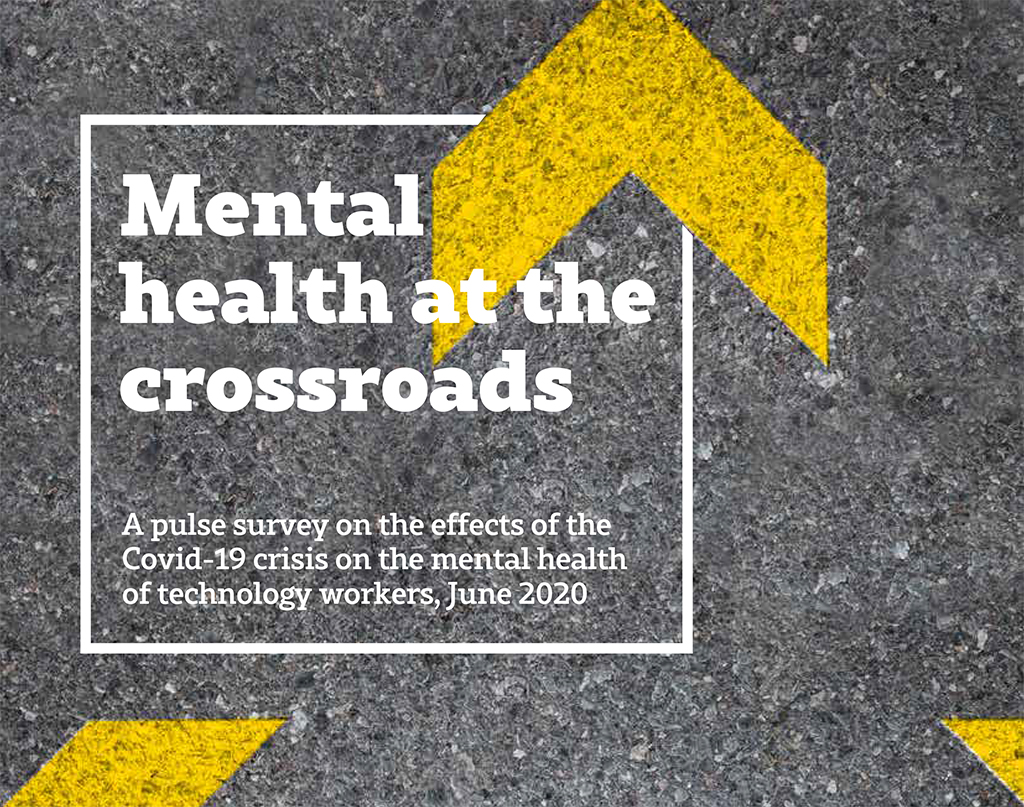The easing of lockdown restrictions and a return to offices is raising the stress levels of over a quarter of UK tech professionals (26%) at a time when over 1 in 3 (36%) report that their mental health has deteriorated during Covid-19, finds a new Harvey Nash Study.
The easing of lockdown restrictions has left tech professionals worrying most about bringing Covid-19 back into the home, and the health risk of their daily commute.
Those tech professionals (60%) that have been/are concerned about their mental health has risen 16% from before the pandemic – this rise is equivalent to an increase of almost 200,000 of the UK’s tech workforce.
These findings are published in a new study by global technology recruiter, Harvey Nash, in association with This Can Happen, the world’s largest online workplace mental health conference. The survey of 1,600 UK technology professionals comprised of – a wider survey prior to the Covid-19 global crisis, and then a Pulse Survey during the crisis to measure the mental wellness of UK Tech’s workforce in lockdown.
Other key findings include:
- Concerned about mental health for the first ever time – Of those people (27%) actively concerned about their mental wellbeing now, 35% say this is the first ever time they have been concerned.
- For 1 in 10 the stress they’re feeling is negatively impacting on their work – This is almost twice as likely to apply to permanent workers as to IT contractors.
- IT roles under most pressure – Those in Project/Programme Management or IT Operational roles, who were under most strain to rapidly move large workforces into remote/virtual environments, have seen their mental health affected the most. Prior to the crisis, 1 in 5 workers in IT Operations were concerned about their mental health, but this has risen to around 1 in 3 as a result of Covid-19.
Help and support…
Although 56% of companies have increased the level of personal/emotional/home working support provided during the crisis, half still don’t provide formal support for mental health issues. This is having a significant impact, with three quarters (75%) of those working for unsupportive companies being either concerned about their mental health now or in the past. This drops by a quarter amongst very supportive companies. Staff at unsupportive companies are also more likely to have seen their mental health deteriorate during lockdown.
Chris Seel, a Director at Harvey Nash Group, said: “Our research reveals the extent of the mental health challenge facing the tech sector – and, by extension, the whole of the UK business community. The ramifications of the Covid-19 pandemic are far-reaching and people are already feeling the strain, many of them for the first time. Whilst it’s encouraging that the majority of businesses have increased the levels of support they provide, there remains much further to go.
Employers are frequently good at introducing informal support mechanisms such as online resources or voluntary networks, but providing formal support such as counselling is harder to do and costlier as well. With staff having moved to remote working – and likely to spend more time working remotely on an ongoing basis – the task becomes more difficult still. With less face-to-face contact, it is harder for managers to pick up on the signs that someone is struggling. Individuals are less likely to reach out for support if that first, immensely difficult conversation needs to be by phone or video call. Mental health support becomes much more difficult at the time when it is needed most.”
Zoe Sinclair, Co-Founder, This Can Happen, added: “It’s encouraging to see that 56% of companies have increased the level of personal and emotional support to their employees. However, at such an uncertain time we believe that this figure should be much higher as looking after your employees’ mental health should be a top priority for all businesses.”
Switching off in an ‘Always on’ world
Prior to the crisis Harvey Nash discovered that the single highest cause of stress was the perennial issue of being short of staff, however during the crisis, the top three causes changed markedly to:
– Not having any time to personally switch off (46%)
– Worrying about losing their job (41%)
– ‘Always on’ technology (33%)
Around a third of those tech professionals with children also reported that caring for/home schooling children is one of the main causes of their stress. With schools only opening up for a limited number of children in June, this issue is likely to continue for most.
In general, the study found that you’re more likely to see your mental health deteriorate during Covid-19 if:
– You’re working, rather than furloughed
– You have a family
– You work more than 50+ hours a week
– You work for an unsupportive company
Coping strategies…a quarter have turned to alcohol.
To help cope with enforced isolation and rising work and personal/family pressures, almost a quarter (24%) of tech professionals have increased their consumption of alcohol. At the same time, other popular coping strategies include – increasing exercise levels (63%), dedicating more time to a hobby/past-time (53%), and a fifth have either practised mindfulness/yoga or other meditative activity, or sought counsel from friends and family.
The Midlands is hit the hardest
Chris Seel, a Director at Harvey Nash Group, concluded: “In these challenging times for individuals and businesses, and with conditions likely to be difficult for months or even years ahead, there is a real risk that mental health could continue to deteriorate. That is why now is the time for businesses to act and do everything they can to get the right support in place. Mental health support is not a one-time fix – it needs to be continually reviewed and refreshed. It needs to be high up the executive agenda and have senior backing. Failure to respond to what is evolving in front of us now could lead to much bigger problems further down the line.”









